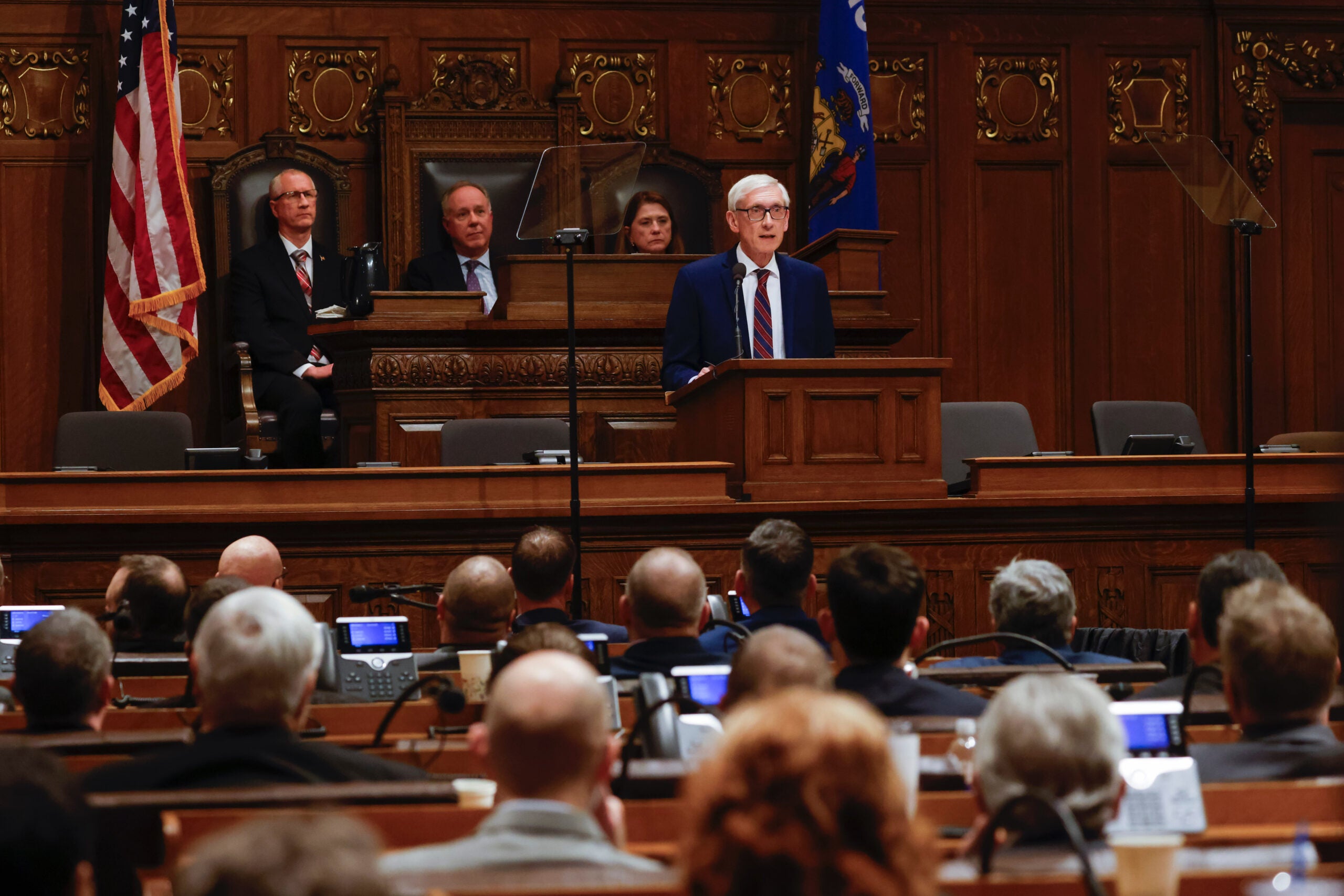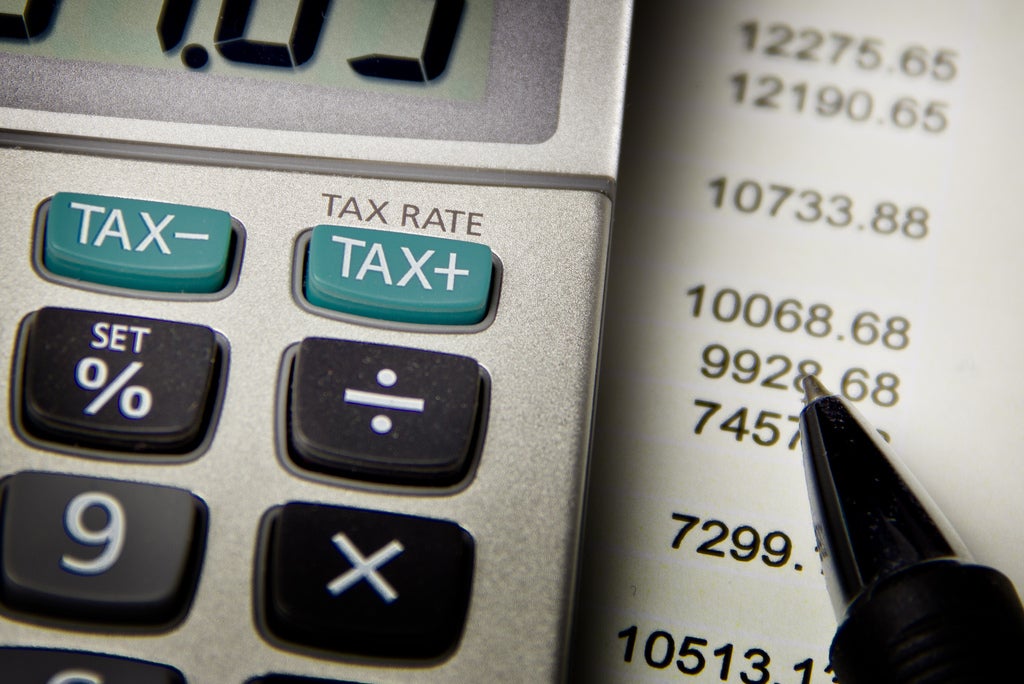State lawmakers are advancing a proposal to cut nearly $3 billion in income taxes over two years.
But Democratic Gov. Tony Evers calls the proposal fiscally irresponsible and promises to stop the bill from becoming law.
A recently-introduced Assembly Bill would expand retirement tax breaks for Wisconsinites who are at least 67 years old, to exempt up to $100,000 in retirement income for single filers and up to $150,000 for joint married filers. It would also cut the tax rate for Wisconsin’s third income tax bracket from 5.3 to 4.4 percent starting in the 2023 tax year.
Stay informed on the latest news
Sign up for WPR’s email newsletter.
That third bracket covers individuals with between $27,630 and $304,170 in annual taxable income, as well as joint filers who make between $36,840 to $405,550.
Effectively, the proposed changes would bring the tax rate for Wisconsin’s third tax bracket to the same level as what’s currently levied against Wisconsin’s second tax bracket, which covers individuals with $13,810 to $27,630 in annual income.
The median household income in Wisconsin is about $67,000 a year, according to 2021 data from the U.S. Census Bureau.
Republicans like state Rep. John Macco of Ledgeview say the cuts would make Wisconsin competitive with other states while bringing relief to the middle class.
“100 percent of this money is going to folks that need it the most,” Macco, who chairs Wisconsin’s Assembly Committee on Ways and Means, said of the proposal.
The bill would lead to tax decreases for about 1.7 million filers in 2023, with an average cut of $772, according to the Legislative Fiscal Bureau.
Evers, however, says the bill would jeopardize “priorities like public schools, child care, public safety, and fixing our roads and bridges.” He promised to veto it if it clears the Republican-controlled state Legislature.
“I’m not going to sign an irresponsible Republican tax cut that jeopardizes our state’s financial stability well into the future and the investments we need to be making today to address the real, pressing challenges facing our state.” Evers posted to social media on Wednesday.
Wisconsin is projected to end the two-year budget cycle with a $4 billion surplus, and Republicans want much of that money to go to tax cuts.
But, during a Ways and Means Committee hearing on Wednesday, state Rep. Sue Conley, D-Janesville, says she still has questions about the fiscal impact of the income tax bill.
“We have the money today, but I don’t I don’t have the confidence that we’re going to have the money in three years,” she said. “And I just think this needs more time to be vetted more deeply.”
Democrats pointed to an analysis from the Legislative Fiscal Bureau, which predicted that the changes could lead to a general fund structural imbalance in the next budget cycle, with spending exceeding revenue by $651 million in 2025-26.
But Macco says it’s disingenuous for Democrats to raise concerns about a projected deficit, since that’s based on the assumption that revenue and spending will remain constant in future years.
“That’s assuming … everything would be stagnant going forward, so it’s a misnomer, and a misunderstanding of how the budgetary process works,” he said. “The structural deficit question is a red herring.”
The state’s Constitution requires Wisconsin to pass a balanced budget. And the LFB analysis notes, “the intent of the exercise is to provide policymakers with an indication of the beginning point for the budget of the succeeding biennium. It does not project whether the next budget will have a surplus or a deficit.”
Democrat Tod Ohnstad joined Republicans on Ways and Means this week in voting to recommend passage of the bill. But the Kenosha representative said he has yet to decide how he’ll vote when the matter’s before the full Assembly on Tuesday.
“I do have concerns about the sustainability of this tax cut,” Ohnstad said. “But I also recognize that … people in my district make 80 percent of what the median income is in the state of Wisconsin, and I also have thousands of retirees that are in my district.”
To override a veto, legislators need a two-thirds majority in both chambers. That means Republicans in the state Assembly would need to get enough Democrats on their side.
State Rep. David Steffen, R-Green Bay, a sponsor of the tax cut bill, says he’s hopeful Evers will change his mind about a veto before the proposal gets to the governor’s desk.
“There should be full recognition that this is going to be a significant benefit for the middle class families in Wisconsin, as well as our senior citizens,” Steffen said.
Steffen called accusations that the bill is fiscally irresponsible “a bunch of malarkey.”
“The $2.9 billion goes directly back to the people for an overpayment that was made, returning their surplus,” he said. “We will still have a billion dollars of surplus to discuss options further into the session, to discuss what are some mutually agreed upon priorities.”
Evers has accused Republicans of rejecting middle class tax relief by not backing his previous proposal which included cutting taxes by 10 percent for individuals making less than $100,000 a year.
This summer, Evers nixed part of the budget passed by Republicans when he vetoed tax cuts for Wisconsin’s top two income tax brackets. That includes the bracket targeted in the latest Assembly Bill.
Also, on Wednesday the Ways and Means committee voted along party lines to advance a ballot proposal that seeks to amend Wisconsin’s Constitution to make it harder to raise taxes.
That Republican-backed initiative would mandate approval by a two-thirds majority of the state Legislature in order to increase income, sales or franchise taxes in the future.
To get on the ballot, that measure still needs to be approved by a majority of the state Legislature in two consecutive sessions. Then, for the change to into effect, it would need to be approved by at least 51% of state voters.
Wisconsin Public Radio, © Copyright 2025, Board of Regents of the University of Wisconsin System and Wisconsin Educational Communications Board.




